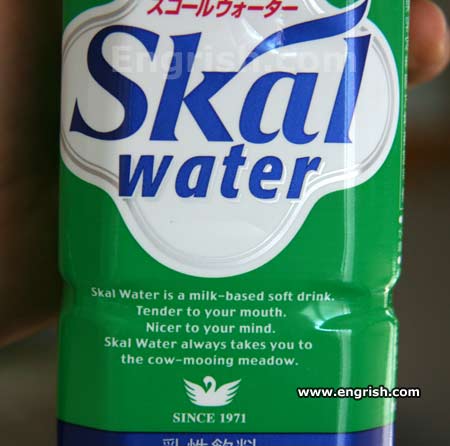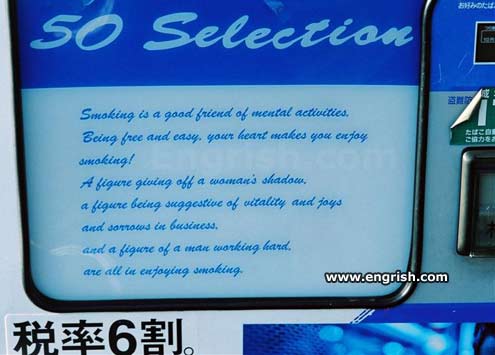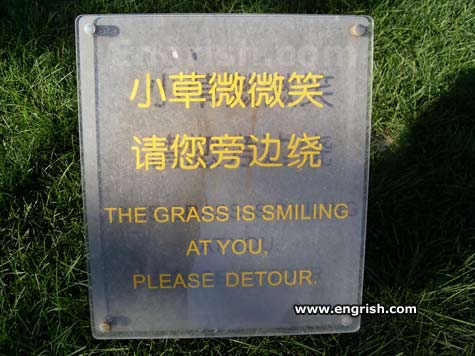Here is a brief overview of what we plan to research!
Our goal is to explore the integration of Anglicization in everyday Japanese culture.
What is Engrish?: Engrish is a term to describe incorrectly translated, misspelled passages of a foreign language and culturally misunderstood phrases into English. The origin of Engrish came from Japan where Japanese words would be poorly translated into English phrases on everyday products, signs, advertisements, etc. It has turned into an internet fad, and is perhaps mostly popularized by Engrish.com. The term 'Engrish' is a play on how the letter 'L' is pronouced like an 'R' in Japanese. Engrish can also be called Japlish.
So... what does Engrish look like?:
From Engrish.com:
Snacks

Drinks

Vending Machines

While Engrish is usually interpreted as humorous, some of the translations are actually correct in the original meaning in the original culture.
Example:

This image was titled 'Creepy Grass Sign', because it talks about smiling grass. However, if you read the original Chinese characters, you will find that the translation is the exact same. The cultural difference makes it appear humorous to North Americans. But it probably sounds normal to a Chinese person. Basically, it's saying "Please don't step on the grass."...because it has a life just like the rest of us. Creative, eh?
What we plan to look for:
Form of placement (on a billboard? or a food package? is it in a restaraunt? or a department store?)
- We will examine where the Engrish is located and what form it is in. Then we will add our own personal comments to come up with unifying conclusions.
- Our hypothesis is that the smaller the restaraunt, the more divergent the English. We also propose that locally owned, as opposed to franchised, establishments will have a higher rate of divergent English.
We will categorize the different forms of placement and rate them on a hilarity scale based on our scientifically proven funny factor. The more divergent the English, the more lolpoints it gets. If we enjoy the specimen, we will award it a Potato-Smiley, if it is 100% cringe-worthy it is punished with a Tomato-Frowny.
Regional Prevalence
Prevalence of English in Japanese Speech
What do Japanese people think of Engrish?
Is it humourous or offensive? Do they care? Even though we may find a phrase absolutely hilarious, as a direct translation it might actually make perfect sense to a Japanese person. Is this common? Or do they also find it humourous too? Perhaps Engrish comes from the fact that not many people actually know English at a working fluency?
We will try to answer these questions, comment on our findings, and ultimately come up with a conclusion (or several).
We will perform our research as follows:
Our sources of information will be Japanese people (to find out their attitudes towards Engrish, and also to assist us in translating and interpreting the original meaning), random products, advertisements, signs etc. we stumble across on our journeys.
PLAN OF ACTION!!!:
We will breaking up into pairs and venturing out into the city, taking photos of Engrish, making videos, interviewing conversation partners and others at Senshu University.
We plan on exploring CMA (Central Metropolitan Area), Shibuya, Yokohama, Shinjuku, Akihabara, the area around the university, and whatever other areas we happen to travel to.
We will take pictures and make videos of our findings, post them here, and comment on it, giving our own (or assisted) conclusions on the original meaning, how it got misinterpreted, and how humorous it is.
For the first section of our research, we will try to take as many photos as we can to collect various Engrish samples to analyze. For the second component we will gather different students and instructors and interview them about their feedback and opinions regarding Engrish. Each week, we will have one post per pair on our findings provided with our comments and hilarity ratings.
Please feel free to give us any suggestions or criticism on this project!
Love,
Regional Prevalence
- What regions are more prone to Engrish? Does distance from the commercialized downtown core have an effect on frequency? Because our group will be visiting Kamakura, we will examine which city has more incidents of Engrish and give our conclusions as to why.
Prevalence of English in Japanese Speech
- Katakana is used to phonetically translate Western words into Japanese. When spoken, these katakana words sound very similar to the original Western words, just with an added hint of Japaneseness. For example, "class" is transcribed into クラス (ku-ra-su). However, the Japanese language has its own word for "class" which is 授業 (jyugyou). We would like to see whether or not Japanese people have a tendency to use katakana words over their traditional Japanese counterparts.
- This includes analyzing the flow of speech with our language partners and other students and instructors at Senshu University. How often do they use westernized words? We will ask them why they do: Do they find them more convenient? Is it cooler? Does it make one sound more intellegent? Is it easier to write than kanji?(well...obviously....) How do demographics factor in? Do young people use it more often than older ones?
What do Japanese people think of Engrish?
Is it humourous or offensive? Do they care? Even though we may find a phrase absolutely hilarious, as a direct translation it might actually make perfect sense to a Japanese person. Is this common? Or do they also find it humourous too? Perhaps Engrish comes from the fact that not many people actually know English at a working fluency?
We will try to answer these questions, comment on our findings, and ultimately come up with a conclusion (or several).
We will perform our research as follows:
Our sources of information will be Japanese people (to find out their attitudes towards Engrish, and also to assist us in translating and interpreting the original meaning), random products, advertisements, signs etc. we stumble across on our journeys.
PLAN OF ACTION!!!:
We will breaking up into pairs and venturing out into the city, taking photos of Engrish, making videos, interviewing conversation partners and others at Senshu University.
We plan on exploring CMA (Central Metropolitan Area), Shibuya, Yokohama, Shinjuku, Akihabara, the area around the university, and whatever other areas we happen to travel to.
We will take pictures and make videos of our findings, post them here, and comment on it, giving our own (or assisted) conclusions on the original meaning, how it got misinterpreted, and how humorous it is.
For the first section of our research, we will try to take as many photos as we can to collect various Engrish samples to analyze. For the second component we will gather different students and instructors and interview them about their feedback and opinions regarding Engrish. Each week, we will have one post per pair on our findings provided with our comments and hilarity ratings.
Please feel free to give us any suggestions or criticism on this project!
Love,
from Team Engrish:
ReplyDelete- put japanese and then translate it into english (Yang-sensei's suggestion)
- break into sections: cultural and language
- talking to english speakers
- analyzing the way japanese people speak english to you on the street?